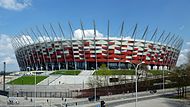The 2012 UEFA European Football Championship, commonly referred to as Euro 2012, is the 14th European Championship for national football teams organised by UEFA. The final tournament is being hosted by Poland and Ukraine between 8 June and 1 July 2012. It is the first time that either nation has hosted the tournament. This bid was chosen by UEFA's Executive Committee in 2007.[1]
The final tournament features 16 nations, the last European Championship to do so (from Euro 2016 onward, there will be 24 finalists). Qualification was contested by 51 nations between August 2010 and November 2011 to join the two host nations in the tournament. The winner of the tournament gains automatic entry to the 2013 FIFA Confederations Cup hosted by Brazil
The tournament is played across eight venues, four in each host country, five of which were newly built for the tournament. Aside from venues, the host nations have also invested heavily in improving infrastructure, such as railways and roads, at UEFA's request.
Host selection
The hosting of the event was initially contested by five bids representing seven countries: Croatia–Hungary, Greece, Italy, Poland–Ukraine, and Turkey. In 2005 these were narrowed down by UEFA to three candidates: Croatia–Hungary, Poland–Ukraine and Italy.[3] This was followed by a second round of the selection process which among other included visits by UEFA to candidate countries.[4] After that the Poland–Ukraine bid was chosen by a vote of the UEFA Executive Committee at a meeting in Cardiff on 18 April 2007.[1] Poland–Ukraine became the third successful joint bid for the European Championship, after those of Belgium–Netherlands (2000) and Austria–Switzerland (2008). Their bid received an absolute majority of votes, and was therefore announced the winner without requiring a second round. Italy, which received the remaining votes,[1] had been considered favourites to win the hosting but incidents of fan violence and a match fixing scandal were widely cited as factors behind their failure.[5][6][7] Afterwards, there were some changes in the Poland-Ukraine bid regarding the venues. The final approval was made on a UEFA meeting on 13 May 2009.[8]
Venues
Eight cities were selected by UEFA as host venues. In a return to the format used at Euro 1992, Euro 1996 and Euro 2008, each of the four groups is based around two stadiums.
The host cities Warsaw, Gdańsk, Wrocław, Poznań, Kiev, Lviv are all popular tourist destinations, unlike Donetsk and Kharkiv (the latter having replaced Dnipropetrovsk as a host city in 2009).[9]
The obligatory improvement of the football infrastructure includes the building of new stadiums: five of the eight venues are brand new stadiums having completed construction and was ready to open in advance of the tournament; the remaining three (in Kiev, Poznań and Kharkiv) underwent major renovations to improve them.[10][11] Three of the stadiums are fulfilling the criteria of UEFA's highest category stadiums.
The transport system in Poland and Ukraine was also extensively modified on the request of UEFA to cope with the large influx of football fans.[12] (1.4 million tickets have been sold for the games, and over 20,000 people are forecast to cross the Poland–Ukraine border each day during the tournament.[13])
Stadiums
A total of 31 matches will be played during Euro 2012, with Ukraine hosting 16 of them and Poland 15.
| Poland | |||||||
|---|---|---|---|---|---|---|---|
| Warsaw | Gdańsk | Wrocław | Poznań | ||||
| National Stadium Built for tournament Capacity: 50,000[17] | PGE Arena Built for tournament Capacity: 40,000[18] | Municipal Stadium Built for tournament Capacity: 40,000[19] | Municipal Stadium Reconstructed Capacity: 40,000[20] | ||||
| 3 matches in Group A (incl. opening match), 1 quarter-final and 1 semi-final | 3 matches in Group C and 1 quarter-final | 3 matches in Group A | 3 matches in Group C | ||||
 |  |  |  | ||||
| Ukraine | |||||||
| Kiev | Donetsk | Kharkiv | Lviv | ||||
| Olympic Stadium Reconstructed Capacity: 60,000[21] | Donbass Arena Built for tournament Capacity: 50,000[22] | Metalist Stadium Reconstructed Capacity: 35,000[23] | Arena Lviv Built for tournament Capacity: 30,000[24] | ||||
| 3 matches in Group D, 1 quarter-final and the final | 3 matches in Group D, 1 quarter-final and 1 semi-final | 3 matches in Group B | 3 matches in Group B | ||||
 |  |  |  | ||||




No comments:
Post a Comment